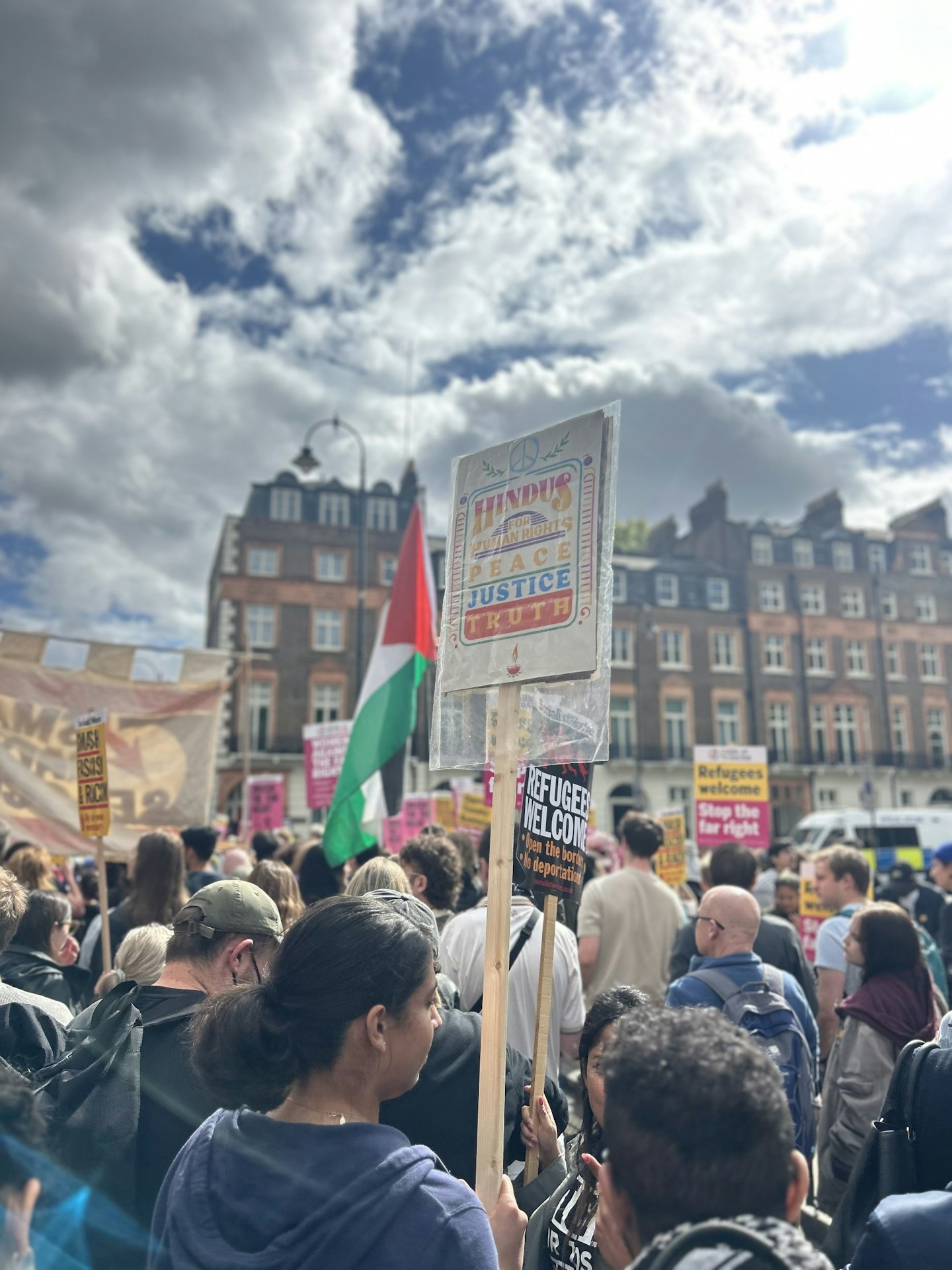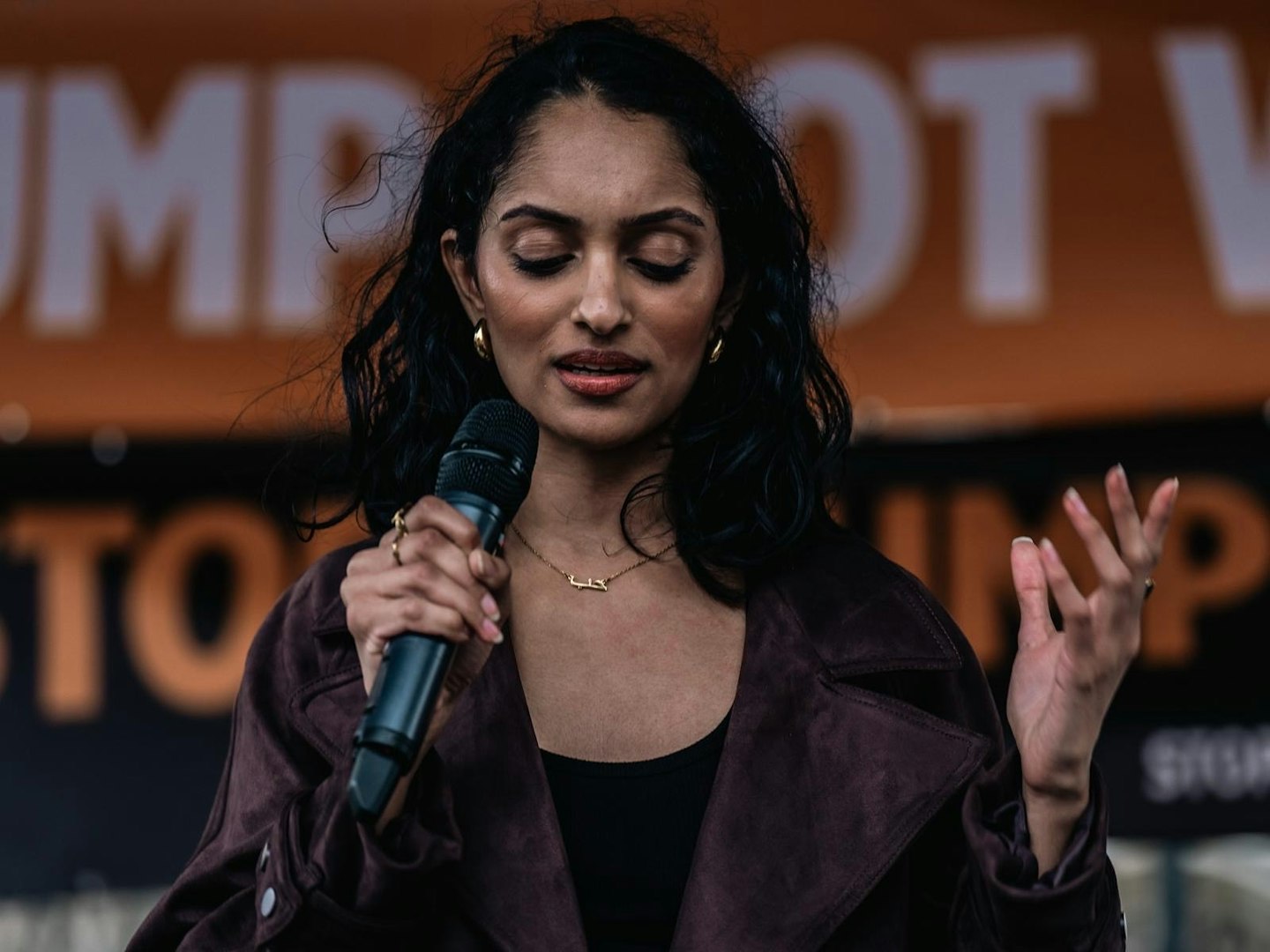The atmosphere at a left-wing protest is like a festival. We chant to drum beats, move at our own pace, meet friends in the crowd. It’s a few hours in which our utopian ideals – those that centre on community, compassion, kindness – are realised.
Earlier this month, I marched in opposition to the Unite the Kingdom rally, a far right demonstration organised by Tommy Robinson. It was a sea of England flags and Union Jacks, symbols contorted into a tribal obsession with migration. Symbols that might have taken on more positive associations, in a different timeline.
We were all tense with the knowledge that recent acts of vandalism had seen the St George’s Cross graffitied on to buildings, roundabouts and zebra crossings across the country – a clear message that this land belonged to a certain population and that they could do what they liked with it.
The graffiti – as intended – left fear and tension stale in the air. It felt like a promise to ‘take back our streets’. And so when I, a British South Asian woman, set off for the march, I felt fear. Until I was swallowed into the warmth and safety of the anti-racist crowd.

This protest, and the Stop Trump rally just days later, were performing the same function. We came together to say: this is our Britain too. We will not see it divided into races and ethnicities; we will not see it cast away those who come to our shores in need; we will not see it descend into fascism.
Any historian will tell you that scapegoating minorities is how fascism begins. Donald Trump, Nigel Farage, Tommy Robinson, Elon Musk. They’re all trying to sow discord, exploit holes in the fabric of our communities, in order to say that only deporting certain minorities can repair it all, and that this requires power in their hands. The power to impose crackdowns, deportations, executive orders, extended police and anti-terror powers. Think of the gross division Musk was trying to seed when he addressed the Unite the Kingdom rally, saying, ‘Violence is coming to you. You either fight back or you die.’
The far-right protesters grew violent, attacking police officers.
The scenes that broke out at Trafalgar Square just after 6pm that day were dystopian. By then, I had already peeled off from the crowd, but people I had marched with earlier found themselves trapped between barriers of police, terrified. They watched the far-right protesters grow violent, attacking officers. There would be 24 arrests that night.
Online it’s not been much better. The comments on social media under my photo from the counter-protest – where I stand in a vest holding a banner – were also dystopian. ‘Deport her to Pakistan.’ ‘Go back to India.’
For all their emphasis on law and order, on respecting this country and its institutions, on engaging with one’s ‘own’ culture – the Unite the Kingdom protest can be characterised by men with flags attacking police, men with flags urinating on walls and men with flags buying onion bhajis. Less about consistency, then, and more about mimicking a sense of community, culture and collective power.

But feeling superior to ethnic minorities is not a culture. Actual British culture is richer and more complex. It’s Vaughan Williams collecting folk songs from the villages; Shakespeare writing about ancient Greece; JMW Turner smudging his painted skies with a thumb; Jane Austen's sharply observed commentary on the 18th Century's landed gentry.
It’s also street markets full of global food, neighbourhoods that are cultural melting pots. It’s a pub lunch and a quaint little church on every street corner. It’s the protest chants at Glastonbury and the zany backroom performances at Edinburgh Fringe. It’s the National Health Service. It’s the acknowledgement that Britain took its flag across the world, colonising an empire where the sun never set, and that now we are all here.
And after all of that, the diversity we enjoy, this rich community tapestry, is simply a miracle.
When we turn out to protest, it’s ultimately because we love this country and want to fight for its better qualities.
